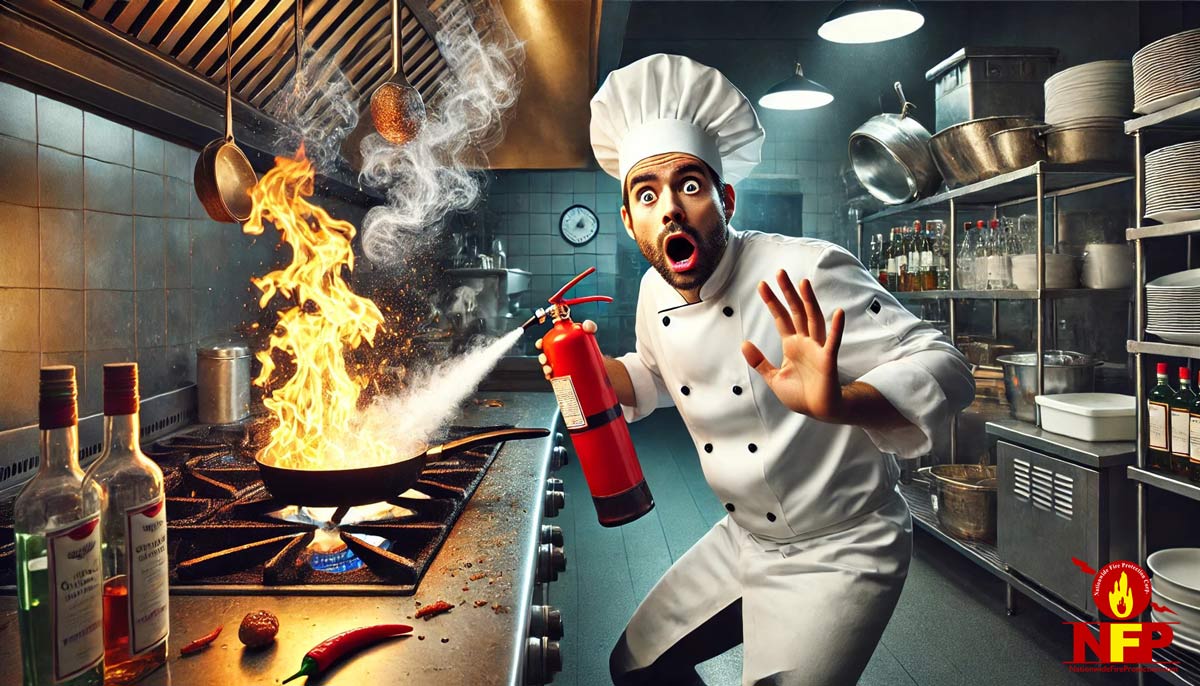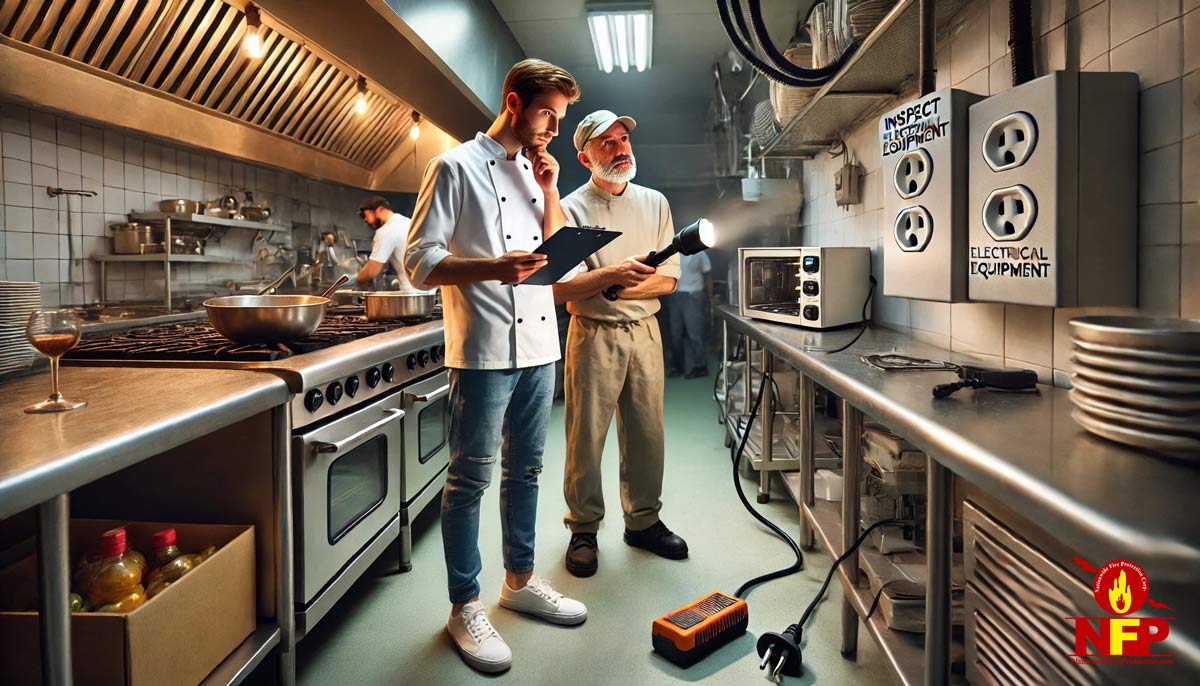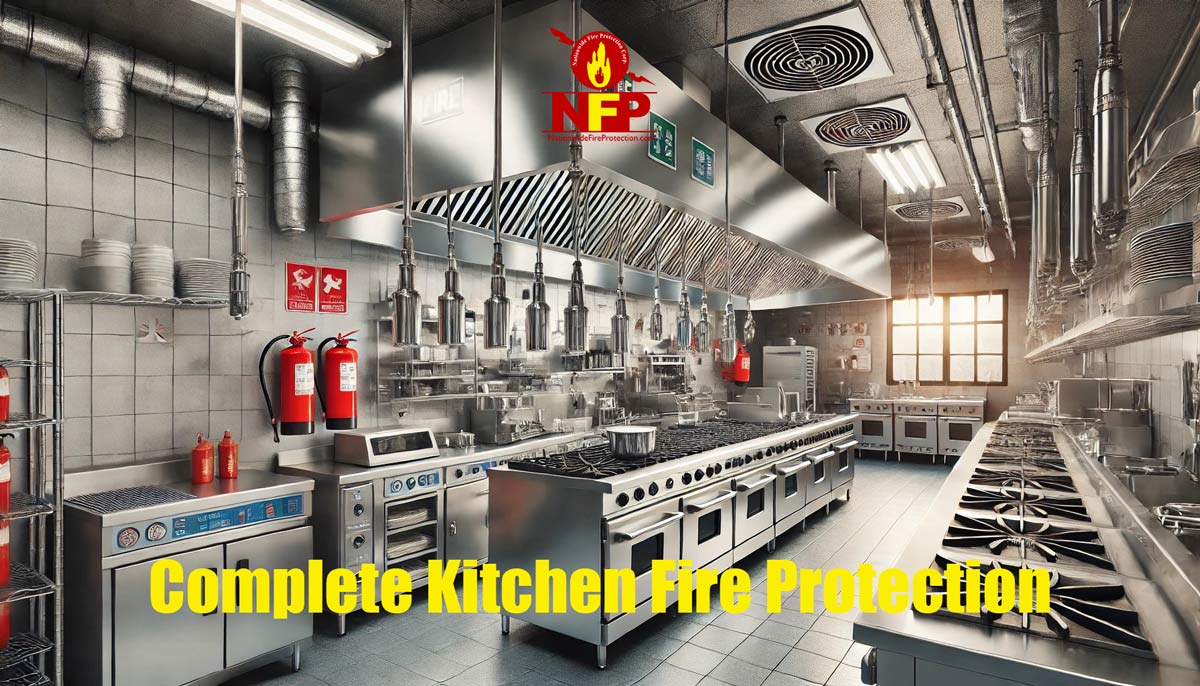Operating a successful food business means prioritizing safety, especially when it comes to kitchen fire protection. A commercial kitchen is the heart of culinary operations but also a hotspot for potential fire hazards. With high temperatures, hot cooking surfaces, and flammable materials, a fire can turn your busy kitchen into a dangerous zone in seconds.
In commercial kitchens, fire safety is not just about meeting local regulations—it’s about protecting your staff, customers, and the future of your business. The combination of frying oils, open flames, and a fast-paced environment makes kitchens in restaurants and catering businesses particularly vulnerable to fire risks. That’s why having a comprehensive kitchen fire protection plan is critical for preventing incidents before they happen and ensuring a quick, effective response when they do.
In this guide, we’ll cover everything you need to know about keeping your kitchen safe from fire hazards, from understanding the most common fire risks to implementing proactive fire safety protocols. This includes vital strategies like proper ventilation, routine equipment checks, and staff training that can significantly reduce the risk of kitchen fires. Whether you’re running a restaurant in Denver, CO, or managing a food establishment in California, these tips will help you create a safer kitchen environment.
Need Expert Kitchen Fire Protection Services?
If you own a
commercial kitchen in Denver, CO, or California,
Nationwide Fire Protection corp. is here to help. Contact us today at (800)750-7313 for a free quote and start
safeguarding your business with top-notch fire safety solutions.
The Most Common Fire Risks in Commercial Kitchens
1. Grease Build-Up
Grease may add flavor to your dishes, but in a commercial kitchen, it can quickly become a serious fire hazard. As oils and fats accumulate on surfaces like stoves, hoods, and vents, they create a flammable layer that can ignite with just a small spark or flame. While a little grease splatter might seem harmless, neglecting regular cleaning can turn this residue into a fire waiting to happen. Prioritize cleaning grease traps, kitchen hoods, and exhaust vents to reduce the risk of grease fires and keep your kitchen safe.
2. Cooking Equipment
Your stoves, grills, and deep fryers are essential tools for preparing delicious meals, but they can also be dangerous if not properly managed. Equipment like deep fryers that operate at high temperatures pose a high risk, especially when food is left unattended. It only takes a few seconds for an overheated pot or pan to catch fire, especially when working with oils or open flames. To prevent accidents, always monitor cooking equipment closely and invest in automatic shut-off features for an added layer of safety.
3. Electrical Hazards
In a busy commercial kitchen, the demand for power is high, and this can lead to electrical fire risks if not properly managed. Overloaded circuits, damaged cords, or faulty appliances can become sources of electrical fires. Regularly inspect all electrical equipment and wiring to ensure everything is in good condition, and never plug too many appliances into a single outlet. It’s crucial to keep your electrical system up to code to minimize the chances of an electrical fire in your kitchen.
4. Flammable Materials

In a kitchen filled with heat and flames, everyday items like paper towels, aprons, or cardboard packaging can quickly become a fire hazard. These materials ignite easily when exposed to open flames or hot surfaces. To minimize the risk, store these items away from cooking areas, stoves, and ovens. Organize your kitchen storage areas, ensuring that flammable materials are kept in designated, safe spaces away from potential ignition sources.
5. Improper Ventilation
Proper ventilation is more than just keeping the kitchen cool—it plays a key role in fire safety. If your kitchen’s ventilation system is clogged or inefficient, heat and smoke can build up, increasing the risk of a fire. Dirty or blocked filters can also trap grease and dust, which may catch fire. Regularly clean and maintain your ventilation system, including ducts and filters, to ensure proper airflow and reduce the risk of fire incidents in your kitchen.
6. Neglecting Fire Safety Equipment
Having fire safety equipment like fire extinguishers and fire suppression systems is crucial, but they are only effective if maintained and used correctly. Without regular inspections, equipment can become outdated or fail during an emergency. Make sure all fire extinguishers are fully charged and that your fire suppression system is professionally inspected at least once a year. Additionally, train your staff to locate and use this equipment effectively to ensure everyone is prepared in case of a fire.
7. Lack of Fire Safety Training
A well-trained staff is your first line of defense against kitchen fires. If your team is unaware of fire safety protocols, they may not respond quickly or correctly in an emergency. Regular training sessions should cover the proper use of fire extinguishers, understanding evacuation routes, and recognizing early signs of fire risks. Hosting regular fire drills can ensure that everyone knows their role, helping to reduce panic and chaos during an emergency.
8. Cooking with Alcohol
Cooking with alcohol can add unique flavors to dishes, but it also introduces a significant fire risk. Alcohol vapors are highly flammable, especially when near open flames or hot surfaces. When using alcohol in cooking, take extra precautions, such as turning off nearby flames and keeping a fire extinguisher close by. A small misstep can result in a dangerous flare-up, so be sure to practice caution at all times.
Comprehensive Kitchen Fire Protection Protocols
1. Understand Your Equipment
The first step in effective kitchen fire safety is becoming familiar with all your cooking equipment. Each appliance, from stoves and grills to deep fryers and ovens, has its own fire risks. Understanding how these appliances work and recognizing their potential hazards is essential for preventing fires. Ensure that your staff knows how to properly operate, clean, and maintain all equipment, and never use equipment that shows signs of damage or malfunction. A well-informed team can spot potential dangers before they become a serious problem.
2. Maintain a Rigorous Cleaning Schedule
A clean kitchen is a safer kitchen, especially when it comes to preventing grease fires. Develop and adhere to a strict cleaning schedule that includes daily, weekly, and monthly tasks. Daily cleanings should focus on wiping down cooking surfaces, cleaning up spills, and emptying grease traps. Weekly deep cleans should include scrubbing hoods, filters, and exhaust systems. A monthly maintenance routine can tackle more extensive tasks like vent duct cleaning. Keeping up with these practices reduces the risk of grease build-up, which is a leading cause of kitchen fires.
3. Safe Storage of Flammable Materials
Proper storage is critical to maintaining a fire-safe kitchen environment. Items like paper products, oils, and cleaning supplies can become fire hazards if stored too close to heat sources. Store flammable materials in designated cabinets that are cool and well-ventilated. Ensure that cooking oils and other highly flammable substances are kept away from open flames or hot surfaces. Organizing your storage areas not only prevents fires but also makes it easier to locate items when needed.
4. Regular Ventilation System Checks
A properly functioning ventilation system is key to managing heat, smoke, and airborne grease in a commercial kitchen. Regularly inspect and clean ventilation components, including exhaust fans, ducts, and filters, to ensure they are free from grease and other debris. Clogged or dirty vents can trap heat and increase the likelihood of a fire. Schedule professional inspections to ensure your system meets local safety codes and operates efficiently, reducing the risk of fire hazards.
5. Keep Fire Extinguishers and Suppression Systems Ready
Every commercial kitchen should be equipped with Class K fire extinguishers, specifically designed for grease and oil fires, as well as a professionally installed fire suppression system. Conduct regular checks to ensure extinguishers are fully charged and placed in accessible locations throughout the kitchen. Suppression systems should be inspected annually to ensure they are functioning correctly. Make sure your team knows where each extinguisher is located and how to use it properly during an emergency.
6. Train Your Team on Fire Safety Protocols

Your staff is your most valuable asset in fire prevention and emergency response. Hold regular training sessions on fire safety that cover the basics of operating fire extinguishers, identifying potential hazards, and understanding evacuation routes. These sessions should also include hands-on fire drills to familiarize everyone with the emergency process. Well-trained employees can act quickly and efficiently in a crisis, significantly reducing the potential damage caused by a fire.
7. Never Leave Cooking Unattended
It might seem like a basic rule, but one of the most common causes of kitchen fires is unattended cooking. Always have someone monitoring cooking appliances when in use, especially when working with oils or high heat. If a chef needs to step away, make sure another team member takes over. Installing timers or automatic shut-off features can also help reduce the risk of overheating. This simple practice can prevent many of the most common kitchen fire incidents.
8. Inspect Electrical Equipment Regularly
Electrical equipment is a key component of any commercial kitchen, but faulty appliances and wiring can pose serious risks. Conduct regular inspections of electrical cords, outlets, and devices for signs of wear and tear. Replace frayed cords immediately and avoid using extension cords as a permanent solution. It’s also important to ensure that your kitchen’s electrical system is up to date and can handle the load of multiple appliances without overloading circuits, reducing the risk of electrical fires.
9. Practice Caution When Cooking with Alcohol
While cooking with alcohol can add complex flavors to dishes, it also introduces a fire hazard in the kitchen. Alcohol vapors are highly flammable, particularly when exposed to open flames or high temperatures. To mitigate this risk, always add alcohol away from active flames and keep a Class K fire extinguisher nearby. By taking these precautions, you can continue to elevate your dishes without compromising kitchen safety.
10. Establish an Emergency Plan
Having a clear and well-practiced emergency plan is crucial for minimizing harm during a fire. This plan should include detailed evacuation routes, designated meeting points outside the building, and specific roles for staff members during an emergency. Regularly review the plan with your team to ensure everyone knows what to do if a fire breaks out. A well-prepared team can evacuate quickly and safely, ensuring the well-being of all employees and customers.
11. Use Fire Safety Signage as Reminders
Visible fire safety signage can serve as constant reminders for your team to stay alert and follow safety protocols. Post signs near cooking areas that highlight important safety tips, such as keeping flammable materials away from heat sources or instructions on using a fire extinguisher. These reminders can help reinforce good habits and keep fire safety top of mind in a busy kitchen environment.
Frequently Asked Questions (FAQs) About Kitchen Fire Protection
1. What is a fire suppression system, and why is it important for commercial kitchens?
A fire suppression system automatically detects and extinguishes fires, specifically grease fires, in commercial kitchens. It helps prevent the spread of flames, reduces damage, and meets safety regulations.
2. How often should fire safety equipment be inspected?
Fire extinguishers should be checked monthly, kitchen hoods and vents every three months, and fire suppression systems should be professionally inspected annually.
3. What type of fire extinguisher is best for a kitchen fire?
Class K fire extinguishers are best for kitchen fires as they are specifically designed to combat fires involving cooking oils and fats.
4. Can I use water to put out a grease fire?
No, using water on a grease fire can cause the flames to spread. Use a Class K extinguisher or activate the fire suppression system.
5. What are common fire hazards in commercial kitchens?
Common fire risks include grease build-up, unattended cooking, faulty electrical equipment, and improper storage of flammable materials.
6. How can I prevent grease fires in my kitchen?
Regularly clean grease traps, hoods, and vents, and avoid letting grease build up on surfaces. Proper ventilation and routine maintenance are key.
7. Why is staff training important for kitchen fire safety?
Training ensures that employees know how to use fire safety equipment, follow evacuation procedures, and respond quickly in case of a fire, reducing the risk of injury and damage.
8. What should I do if a fire breaks out in my kitchen?
Activate the fire suppression system, use a Class K extinguisher if safe, evacuate the premises, and call emergency services immediately.
9. Do I need a fire suppression system to be compliant with local regulations?
Yes, most local fire codes require commercial kitchens to have a fire suppression system to ensure the safety of staff and customers.
10. How does a fire suppression system work?
It automatically releases a chemical agent to suppress flames and cool surfaces when a fire is detected, helping to contain the fire until emergency services arrive.
Protect Your Food Business with Professional Kitchen Fire Safety Solutions in Denver, CO, and California
In the food service industry, comprehensive kitchen fire protection is all about proactive planning and preparation. It’s not just about installing the right equipment; it’s about creating a culture of safety where every team member understands their role in preventing and responding to fire risks. From regular maintenance and inspections to ensuring your staff is well-trained in emergency protocols, every step plays a crucial part in minimizing fire hazards.
A well-maintained kitchen with clean equipment, functional ventilation systems, and properly stored flammable materials can significantly reduce the chances of a fire. By staying vigilant and keeping your kitchen organized, you can protect your team, safeguard your customers, and keep your business running smoothly without interruptions.
Nationwide Fire Protection is dedicated to helping businesses across Denver, CO, and California prioritize kitchen fire safety. With our expert services, including fire suppression system installation, equipment inspections, and comprehensive safety consultations, you can focus on what you do best—serving delicious meals—while we ensure your kitchen stays safe.
Don’t Leave Fire Safety to Chance!
Reach out to Nationwide Fire
Protection today at (800)750-7313 for a free
consultation and learn how we can help you implement a full-spectrum kitchen
fire protection plan. Safeguard your establishment, ensure compliance
with local regulations, and keep your kitchen safe from unexpected fire hazards.

